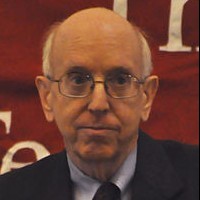Posner says he is open to litigating on behalf of pro se litigants, defends book

Retired 7th U.S. Circuit Court of Appeals Judge Richard Posner.
Retired Judge Richard Posner isn’t giving up on his crusade to help pro se litigants, even as he defends his book on the subject amid criticism for its use of internal memoranda from his former court, the Chicago-based 7th U.S. Circuit Court of Appeals.
Posner tells the ABA Journal he isn’t ruling out handling a case on behalf of pro se litigants.
Posner’s self-published book, Reforming the Federal Judiciary: My Former Court Needs to Overhaul Its Staff Attorney Program and Begin Televising Its Oral Arguments, was released earlier this month. In the book, Posner says he was rebuffed in efforts to give pro se litigants a better shake by reviewing the memos of 7th Circuit staff attorneys, who evaluate appeals by such litigants and make recommendations in their cases.
In the first few days after release of the book, the 78-year-old retired justice says he received more than 100 emails, and a number of them were from people affiliated with or knowledgeable about organizations that try to help pro se litigants, who handle their own cases.
Many of the organizations asked Posner to participate in their activities, and Posner said he is interested in helping. He also heard from one of the legal aid clinics at the University of Chicago law school, where Posner is a senior lecturer.
The law clinic asked if Posner would be willing to appear in court to represent a pro se litigant, and Posner responded that he would be glad to.
Would Posner represent individual pro se litigants or would he represent litigants in a class action? Posner said he would be open to either, though he has limited time. He noted he had experience with class actions as an appeals judge, and he also conducted several trials as a 7th Circuit volunteer.
“I feel equipped to make a difference,” Posner told the ABA Journal, adding that he “would be glad to help out, whether as serving as a lawyer for pro se’s or providing advice to them, or finding lawyers for them.”
Posner says took a tour of the Cook County, Illinois, jail about a month ago when he was working on the first edition of his book. He asked the warden to see detainees awaiting trial who are handling cases by themselves, and they seemed to have genuine grievances, he said. One of the detainees had been awaiting trial for two years, he said.
“The fault is that a lot of the state judges here do not like trials, the fewer the better, so they tend to set very remote trial dates,” Posner said.
The ABA Journal informed Posner about a caller who wanted to contact the judge after hearing of his concerns about pro se litigants. The caller had lost a home in foreclosure and had a pending federal appeal. Foreclosures “are a very big aspect of the pro se problem,” Posner said. People tend to think of pro se litigants as prison inmates and others at the bottom of the economic ladder. But foreclosures “are an example of middle-class people finding themselves in the pro se box,” he said.
Posner said he is working on a second edition of his book that draws on information he has learned about law schools, law firms, groups and individuals who try to help pro se litigants.
In his first edition of the book, Posner released copies of the staff attorneys’ memoranda, with his revisions to correct what he believed to be mistakes. (A review by CA3blog called the revisions “acid edits.”) He also released an email from Chief Judge Diane Wood raising concerns about the use of internal materials. Wood’s email said the Judicial Conference’s conduct committee believed release of confidential internal materials would be an ethics violation.
Posner tells the ABA Journal that he spoke with the federal judge who administers the judicial codes of conduct, and she said the conduct codes are advisory rather than mandatory. In addition, the codes of conduct are directed at federal judges, Posner said, and he is no longer a federal judge.
The code is very elaborate and it consists of a large number of opinions, which are relatively brief statements, Posner said. Opinion No. 55, on extrajudicial writings by judges, is the one that applied to his book, Posner said.
Opinion No. 55 says judges who write extrajudicial materials should maintain the dignity of the judicial profession. Posner didn’t think he violated that recommendation.
“I thought the sort of things I put in the book that had originated in the court were legitimate, would be interesting to readers … and would not hurt the court,” he said.
Staff attorneys are hired right out of law school and they remain in their jobs for two years, Posner said. They are generally inexperienced and they don’t always get precise guidance, he said.
“Sometimes I found that these staff attorney memos were unsatisfactory, they were inaccurate, they were unfair to the pro se’s, they were just badly written and hard to understand,” Posner told the ABA Journal. “And that was my concern. And some of those defective staff attorney memos, or portions of them, are in my book. As I say, I don’t think there is any impropriety in that, telling the world that staff attorneys … make mistakes.
“So, I don’t think I’ve done anything wrong; obviously the chief judge disagrees.”



